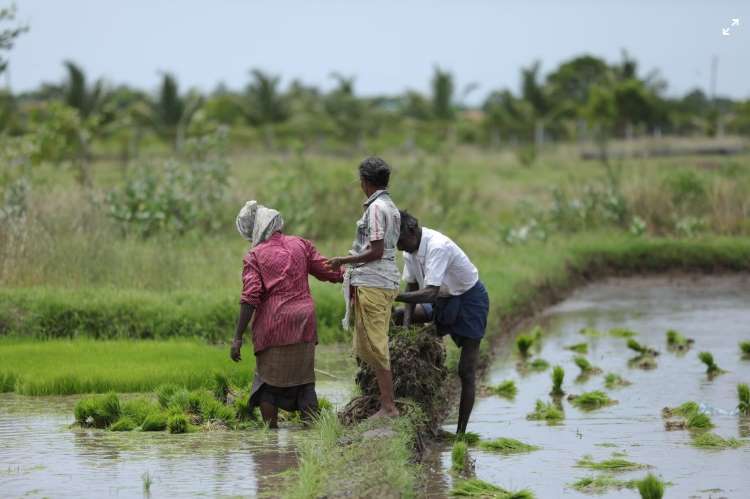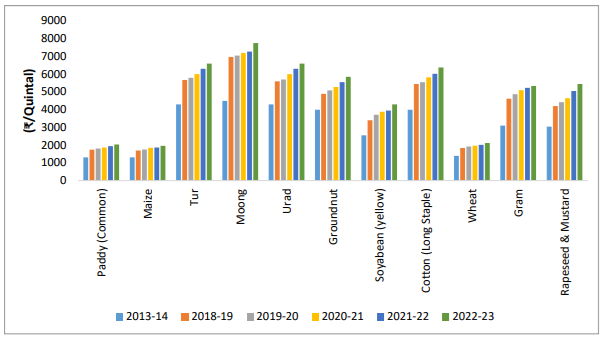
The rail roko strike on Sunday was a testimony to the fact that the farmer protest in India is far from over. The Samyukta Kisan Morcha and the Kisan Mazdoor Morcha staged protest across 60 locations in Haryana and Punjab, seeking to make their voices heard, and highlight the persistent challenges faced by the agricultural sector. The resurgence of the protest highlights the deep-seated vulnerabilities and injustices faced by the agrarian community.
While the immediate demands of the Indian farmers are clear, understanding their grievances requires the knowledge of the evolution of agricultural policy in India. Globally, agricultural practices and policies have undergone significant transformations, with countries adopting various models to balance farmer welfare with market efficiency. In the United States and the European Union, substantial subsidies and support mechanisms are in place to protect farmers against market volatilities.
The Indian context, with its smallholder farming system, demands a uniquely tailored approach that not only supports farmers financially but also integrates them into a sustainable agricultural framework. The historical and global perspective underscores the need for policies that are not just reactive but proactive, anticipating the challenges thrown up by the global market.
READ I Bengaluru’s water crisis is a stark reminder of a looming global threat
Demand for stability at the core of farmer protest
At the heart of the agitation lies the demand for a comprehensive system of Minimum Support Prices (MSP) for all crops, a safeguard against the volatility of agricultural markets. The MSP system, originally conceived in the 1960s, was aimed at preventing farmer exploitation by ensuring a baseline income. However, its application to only a select group of crops has rendered it insufficient in the face of modern agricultural challenges. The farmers’ plea for an extension of this system to all crops is not just a request for financial security, but also a plea for the recognition of their toil as well as a step towards rectifying the economic imbalance that plagues the sector.
The problems of Indian farmers is exacerbated by limited access to technology and innovation, which could mitigate many of the challenges they face. In parts of the world where agriculture thrives, technology plays a pivotal role, from precision farming techniques that optimise water usage and crop yields to digital marketplaces that ensure better prices for farmers’ produce. The integration of technology in Indian agriculture could revolutionise the sector, making it more resilient to climate change, more productive, and more sustainable. However, this requires significant investment in infrastructure, education, and access to technology at the grassroots level, emphasising the need for a comprehensive policy approach that encompasses more than just price supports.
Minimum support price for selected crops (Rs/Quintal)

The farmers issues are not solely economic but are intricately linked with environmental and sustainability challenges. The existing MSP system, while providing temporary relief, has also led to the overproduction of certain crops such as rice and wheat, exacerbating water scarcity and contributing to the degradation of soil health. This paradoxical situation underscores the need for a more nuanced approach to agricultural policy — one that balances economic support for farmers with the imperative of environmental stewardship.
The spectre of climate change looms large over the agricultural sector, with erratic weather patterns, unseasonal rains, and increasing temperatures threatening the livelihoods of millions of farmers. In India, where a significant portion of agriculture is rain-fed, the impact of climate change is particularly acute, making the farmers’ demand for stable prices and government support even more urgent. Adapting to climate change requires a paradigm shift in agricultural practices and policies, integrating climate resilience into the core of agrarian strategy. This includes the development of drought-resistant crop varieties, water conservation techniques, and a shift towards more sustainable farming practices that can withstand the vagaries of a changing climate.
The way ahead
The farmer protests and the government’s response occur against a backdrop of political manoeuvring and electoral considerations. The agrarian sector, forming a substantial share of the electorate, cannot be ignored in the democratic polity of India. The repealing of the agricultural laws in 2021, though a tactical retreat by the Modi government, was a testament to the power of collective action. Yet, the failure to address the underlying issues has led to the resurgence of protests, signalling a critical juncture for Indian politics and agricultural policy.
The way ahead requires a collaborative effort that transcends political affiliations and recognises the complex nature of the crisis. It necessitates a dialogue that includes farmers’ voices in policy formulation, ensuring that solutions are not only economically viable but environmentally sustainable and socially equitable. Moreover, it calls for a shift from the piecemeal approach of the past to a holistic strategy that addresses the root causes of agrarian distress, including market failures, climate change, and the need for technological innovation.
The Union government must listen to the protesting farmers, not as a political concession but as a moral imperative and a strategic necessity. The path to reconciliation lies in genuine engagement and the implementation of policies that reflect the complexities of modern agriculture. This includes not only the expansion of the MSP system but also the promotion of crop diversification, water conservation techniques, and access to markets and credit. Furthermore, it demands an acknowledgment of the farmers’ role not just as food producers but as stewards of the land, whose well-being is inextricably linked to the health of the economy.
The farmers’ protests are a clarion call for a reimagined agricultural policy in India — one that ensures economic security, promotes environmental sustainability, and acknowledges the intrinsic value of the agrarian community. Listening to and addressing the concerns of the protesting farmers is not merely a political necessity but a step towards forging a more just, sustainable, and resilient agricultural future.

